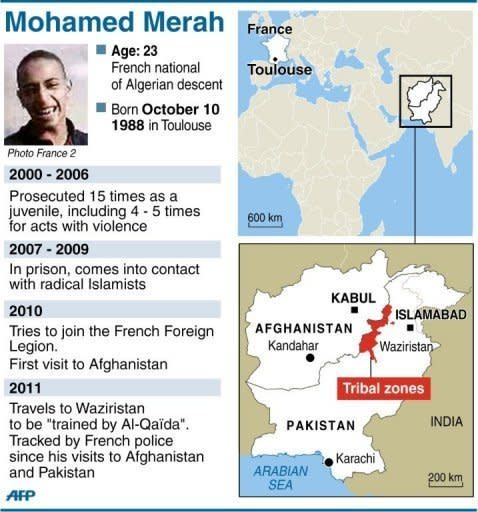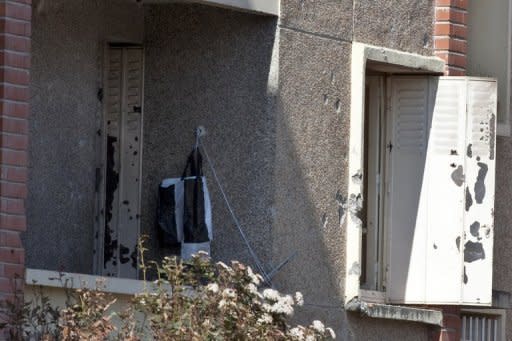France insists no evidence ties gunman to militant groups
French authorities Friday rejected charges that intelligence failures allowed a young man to kill seven people, insisting there was no evidence he was anything but a lone wolf with no ties to Al-Qaeda. Prime Minister Francois Fillon said security officials had known Mohamed Merah, who died in a hail of police bullets, was a radical Islamist who visited Afghanistan, but said there was no reason to suspect he was planning attacks. The intelligence services "did their job perfectly well. They identified Mohamed Merah when he made his trips," he told French radio. Intelligence agents "watched him long enough to come to the conclusion that there was no element, no indication, that this was a dangerous man who would one day pass from words to acts," said Fillon. The head of France's DCRI domestic intelligence agency, Bernard Squarcini, said there was little more that security services could have done to predict or prevent the atrocities by Merah, who died after a 32-hour police siege in the southwestern city of Toulouse. Initial autopsy reports said Merah was fatally wounded by a bullet to the head and another to the abdomen during the final police assault. His body was riddled with other gunshots, a judicial source said. Merah, who claimed to be an Al-Qaeda member who killed to avenge Palestinian children and punish France for sending troops to Afghanistan, did not follow the usual path taken by Islamist extremists, Squarcini told Le Monde daily. "According to statements he made during the siege, he self-radicalised in prison, on his own, reading the Koran," he said. "He said, in any case, everything is in the Koran. So, he was not a member of a network." Merah said that when he travelled to Pakistan in 2011 he did not frequent the usual training centres -- where spies might have reported his presence -- but instead was trained by a single individual, the DRCI chief said. After a 2010 trip to Afghanistan, French agents investigated Merah but found none of the usual danger signs associated with organised extremism, said Squarcini. "No ideological activism, no visiting mosques," he said. Merah, 23 when he died, was jailed in France at 19 for two years for a series of thefts and violent crimes. Fillon and Squarcini's comments came as investigators sought to establish whether Merah had worked alone or with accomplices before he murdered three Jewish children, a trainee rabbi and three soldiers. The killings shocked France, home to western Europe's largest Jewish and Muslim communities, and brought the issues of security and integration to the heart of the country's presidential election campaign. A US intelligence official said that Merah, a French citizen of Algerian origin, had been on America's "no-fly" list that banned him from boarding flights to or from the country because he was considered a terror risk. US Republican congressman from New York Peter King said: "Merah was reportedly detained in Afghanistan but released to France. Merah should have instead been sent to Guantanamo Bay and held as an enemy combatant." Police on Friday prolonged the detention of Merah's mother and brother, whose girlfriend was also still detained, a legal source said. Police and prosecution officials have said that Merah's brother, Abdelkader Merah, is himself a radical Islamist, and that traces of what could be an explosive material were found in his car. Prosecutors said the first murder in Merah's spree was committed after he contacted his victim, a 30-year-old army officer, using his mother's computer. President Nicolas Sarkozy, who is seeking re-election in May, was under growing pressure Friday from the media and opposition politicians to explain why Merah had not been prevented from carrying out his grisly murders. One veteran police officer also questioned why the gunman was not taken alive during Thursday's siege and final assault by the elite RAID unit. "How come the police's best unit did not manage to arrest a man all alone?" demanded Christian Prouteau, who founded the GIGN -- another elite unit, drawn from the national police's rivals in the gendarmerie. Merah's killing spree interrupted the campaign for France's presidential vote, but Sarkozy has resumed his re-election bid hoping his reputation as a crime fighter will carry the day. He has been trailing Socialist rival Francois Hollande in opinion polls for months, but the shocking murders and the killer's violent end have stirred up the campaign just as he was narrowing the gap. Sarkozy vowed Thursday to crack down on extremism, saying he wanted legal action against people who regularly consulted jihadist websites or travelled abroad for indoctrination. Hollande, at a campaign rally, asked about possible failings in the surveillance of Merah and said that now "questions will have to be put." Far-right National Front leader Marine Le Pen said Sarkozy's government had surrendered the poor suburbs of France's cities to Islamic radicals and denounced its failure to prevent Merah's murders. An Al-Qaeda linked group, Jund al-Khilafah, claimed responsibility on jihadist websites for Merah's killings. Toulouse remained on edge following the bloody events, and a high-level "scarlet" terrorism alert was in place. Police evacuated the main city square Friday evening when a suspect package was found, and a police demining squad later blew up the object.





